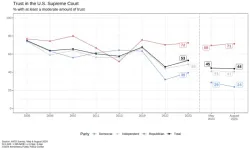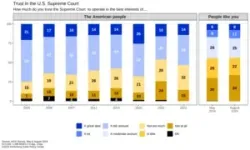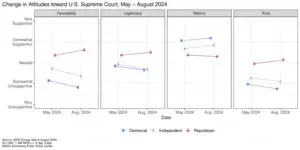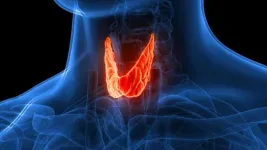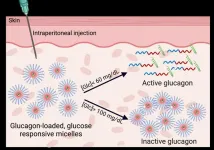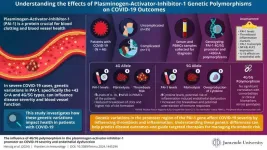(Press-News.org) PHILADELPHIA – Driven by political partisanship, public trust in the U.S. Supreme Court has continued a downward slide since the court’s 2022 Dobbs decision overturning the Roe v. Wade ruling that established a constitutional right to abortion, according to a new survey by the Annenberg Public Policy Center (APPC) of the University of Pennsylvania.
More than half of Americans (56%) now disapprove of the Supreme Court, saying they trust it either “a little” or “not at all” to act in the best interest of “people like you,” according to the nationally representative panel survey conducted in July and August 2024.
Support for the court stands at 44%, with 8% expressing “a great deal” of trust, 11% “a lot” of trust, and 25% “a moderate amount” of trust in the court to act in the best interest of people like you. It is the lowest overall level of trust since APPC began surveying the American public on this issue in 2005, when 75% of the public trusted the court.
Highlights
The new survey, conducted among a nationally representative sample of 1,395 adult U.S. citizens, was fielded July 12-August 12, 2024, following the court’s 2023-24 term, which concluded on July 1 with the court’s ruling in the Capitol insurrection case that Donald Trump has immunity from criminal prosecution for official acts he took as president. The same sample of respondents was previously surveyed in May 2024, during the court term.
In August 2024, 44% overall have trust in the Supreme Court, about the same as 45% in May. But the 40-point spread in trust seen in May between Republicans and Democrats widened significantly to 47 points in August, with 71% of Republicans, 41% of independents, and 24% of Democrats having trust in the court to act in their best interest. Download the topline here.
Earlier APPC surveys found that trust in the court plummeted 22 points after the Dobbs decision, from 68% in 2019 to 46% in 2022. The current survey shows that after a modest rebound, trust has continued to slip, hitting 44% in August 2024. It also finds:
Growing numbers have no trust in the court: Asked how much, if at all, do you trust the court to act in the best interest of people like you, 1 in 3 people (34%) in August say “not at all,” up from 30% in May. In a 2005 APPC survey, only 7% did “not at all” trust the court, which shows a stunning increase in distrust over the past two decades.
Partisan split growing even wider: Over the three-month period from May to August, partisan divisions in views of the court increased significantly. In May, the parties were divided, with Republicans seeing the Supreme Court more favorably, trusting it more, vesting greater legitimacy in it, and being less willing to endorse potential reforms to the court than Democrats and independents. After the court term, the gap separating Republicans from both Democrats and independents grew on each of these dimensions.
Favorability drops in key swing states: Since 2021, APPC has reinterviewed the same set of respondents in Michigan, Pennsylvania, and Wisconsin. These data allow us to compare views of the court from 2021, before the court’s Dobbs decision, to today, two years after that landmark ruling. Over that time, we have seen a dramatic decline in the public’s view of the court – mostly from a decrease in support from both Democrats and independents.
“This underscores how Dobbs has fundamentally shifted views of the court,” said University of Pennsylvania political science professor Matthew Levendusky, the Stephen and Mary Baran Chair in the Institutions of Democracy at the Annenberg Public Policy Center and director of the survey. “For many years, the court was held in high esteem by all Americans across partisan lines, but no more – that polarization emerged after Dobbs, and the court’s rulings since then have done little to change these perceptions.”
Partisan differences in attitudes toward the court
For decades, the Supreme Court had been seen as one of the few institutions respected by Republicans and Democrats alike. In a journal article this year, Annenberg Public Policy Center researchers said the court had been primarily regarded as a legal institution, not a political one, strengthened by its “norms, processes, symbols, and independence,” and was therefore afforded greater public trust and legitimacy than other institutions. (See “Has the Supreme Court become just another political branch? Public perceptions of court approval and legitimacy in a post-Dobbs world” in Science Advances.)
A second article this year by APPC researchers found that declining trust in the Supreme Court was mirrored in the federal judiciary, with the percentage of Americans with either “a great deal” or “a fair amount” of trust and confidence in the judicial branch falling to under 50% in 2022 from 75% in 2000. (See “The withering of public confidence in the courts” in Judicature.)
This year, APPC surveyed a nationally representative sample of adult U.S. citizens during and after the most recent Supreme Court term in, respectively, May and August 2024. These national surveys found that:
Favorability increased slightly among Republicans but decreased among both independents and Democrats.
Trust: Republicans placed greater trust in the court, though trust dropped among Democrats and independents.
Reform: Support for a half-dozen proposed reforms to the U.S. Supreme Court, taken as a group, increased among Democrats and independents, but decreased slightly among Republicans. Overall, a majority of the public shows strong support for several potential reforms to the Supreme Court, including prohibiting justices from participating in cases in which they have personal or financial interests (83% support); creation of a formal ethics code that allows justices to be investigated if they are accused of an ethical violation (75% support); a mandatory retirement age (71%) and term limits (68%). In addition, half of those surveyed (50%) support allowing the public to vote to overturn Supreme Court decisions on controversial issues and a third (32%) support increasing the number of justices on the current nine-member court.
For further details on support for potential reforms to the court, see our news release issued in early September, based on the May 2024 findings.
Legitimacy: Institutional support for the court
In addition to the three measures of support described above, the APPC surveys also asked a set of questions which tap into deeper institutional support for the U.S. Supreme Court. Respondents were asked whether they agreed or disagreed with the following statements:
If the Supreme Court started making a lot of rulings that most Americans disagreed with, it might be better to do away with the Court altogether.
The U.S. Supreme Court gets too mixed up in politics.
The U.S. Supreme Court ought to be made less independent so that it listens a lot more to what the people want.
The right of the Supreme Court to decide certain types of controversial issues should be reduced.
Justices on the U.S. Supreme Court who consistently make unpopular decisions should be removed from their position as Justice.
In our analysis, conducted by APPC research analyst Shawn Patterson Jr., we use the average of each panelists’ responses to these questions as a measure of institutional legitimacy. While the effects are smaller than for favorability or trust, here, too, we see that Republicans viewed the court as more legitimate than Democrats and independents in May, and that the gap between the parties grew significantly over the following three months
Evidence from three swing states
Surveys conducted in three swing states – Michigan, Pennsylvania, and Wisconsin – bolster these findings. Panelists were asked about their favorability toward the court on six occasions from November 2021 through August 2024. These results show that:
Before and after Dobbs, there is a dramatic decline in the public’s view of the court. In 2021, before the decision, the average respondent had a “neither favorable nor unfavorable” view of the court, but post-Dobbs in 2022, that fell 31%, to just more than “somewhat unfavorable” on average and it has remained below pre-Dobbs levels since.
This decrease in support for the court comes mostly from changes among Democrats and independents. In 2021, the difference between the two parties was relatively small, with little partisan polarization in views of the court. Today the gap in favorability between the parties has more than doubled, a 101% increase.
About the surveys
The most recent findings are based on two ongoing Annenberg Institutions of Democracy (AIOD) panel studies, surveys that interview the same sets of voters over time. One is a nationally representative sample of adult U.S. citizens, while the other is a sample of adult U.S. citizens living in Michigan, Pennsylvania, and Wisconsin (the sample in each state is drawn to be representative of adults living in that state). Both sets of respondents were interviewed from May 1-23, 2024, and from July 12-August 12, 2024. The swing state samples have also been interviewed roughly quarterly since May 2020.
Data collection for the national panel was conducted from May 1-23, 2024, among a sample of 1,620 adult U.S. citizens, divided in three subgroups. The margin of sampling error (MOE) for the complete set of weighted data is ± 3.3 percentage points at the 95% confidence level. The panel survey was conducted again July 12-August 12, 2024, among a sample of 1,395 U.S. adult citizens, with a margin of error of ± 3.6 percentage points.
Download the topline and methodology here.
For more information on the sampling of the swing state panel, see the Appendix for the book “Democracy Amid Crises,” available at https://osf.io/487jk/.
The battery of survey questions about court reform was developed under the supervision of Matt Levendusky, director of the AIOD national panel at the Annenberg Public Policy Center. The analysis and graphics were prepared by APPC research analyst Shawn Patterson Jr. The team supervising the survey also includes Kathleen Hall Jamieson, the director of APPC, and Ken Winneg, APPC’s managing director of survey research.
The Annenberg Public Policy Center was established in 1993 to educate the public and policy makers about communication’s role in advancing public understanding of political, science, and health issues at the local, state, and federal levels.
END
Trust in US Supreme Court continues to sink
Asked how much they trust the court to act in their best interest, 1 in 3 Americans say ‘not at all’
2024-10-02
ELSE PRESS RELEASES FROM THIS DATE:
Rice’s Biotech Launch Pad to lead commercialization of bioelectrical implant treatment for obesity, type 2 diabetes
2024-10-02
Rice University is part of a multiuniversity research team that has secured an award of up to $34.9 million from the Advanced Research Projects Agency for Health (ARPA-H) to accelerate the development of a bioelectronic implant designed to improve adherence for obesity and type 2 diabetes (T2D) treatment while reducing development and manufacturing costs.
Rice University’s Biotech Launch Pad will lead the commercialization effort for “Rx On-site Generation Using Electronics” (ROGUE), a self-contained, durable implantable device that houses cells engineered ...
Carnegie Mellon to lead development of implantable cell-based bioelectronic devices for patient-specific treatment and disease monitoring
2024-10-02
PITTSBURGH – A Carnegie Mellon University-led team has secured an award of up to $42 million from the Advanced Research Projects Agency for Health (ARPA-H) to accelerate the development of implantable, cell-based bioelectronic devices that deliver patient-specific therapy and monitor disease status, for conditions like hypo- and hyperthyroidism, in real time. This award is part of the ARPA-H REACT program, which supports the advancement of implantable bioelectronic devices to improve patient management of chronic diseases.
Burak ...
Case Western Reserve, Vanderbilt universities to develop incisionless prostate surgery using MRI and robotics
2024-10-02
CLEVELAND—Researchers at Case Western Reserve University and Vanderbilt University are pioneering a new approach to prostate cancer surgery by combining advanced robotics and “low-field” MRI technology.
The research aims to allow highly accurate, patient-tailored prostate cancer surgeries without the need for traditional incisions. This innovative research marks a major step in developing minimally invasive treatments for prostate cancer, with the potential to improve both safety and efficiency for patients.
The project is being funded by a new five-year, $3.7 million grant from the National Cancer Institute, part of the ...
Carnegie Mellon University secures ARPA-H award to improve adherence, lower cost of treatment for obesity and Type 2 diabetes patients
2024-10-02
PITTSBURGH – A Carnegie Mellon University-led team of researchers has secured an award of up to $34.9 million from the Advanced Research Projects Agency for Health (ARPA-H). The funds will fast track a bioelectronic implant that could radically improve treatment options and significantly reduce the cost of care for patients with obesity and Type 2 diabetes.
The award will drive the accelerated development and testing of “Rx On-site Generation Using Electronics (ROGUE),” a bioelectrical device that hosts a “living pharmacy,” consisting of engineered cells that produce biological therapy to treat Type 2 diabetes and obesity. The device will offer continuous, ...
A new injectable to prevent and treat hypoglycemia
2024-10-02
People with diabetes take insulin to lower high blood sugar. However, if glucose levels plunge too low — from taking too much insulin or not eating enough sugar — people can experience hypoglycemia, which can lead to dizziness, cognitive impairment, seizures or comas. To prevent and treat this condition, researchers in ACS Central Science report encapsulating the hormone glucagon. In mouse trials, the nanocapsules activated when blood sugar levels dropped dangerously low and quickly restored glucose levels.
Glucagon is a hormone that signals the liver to ...
Turning plants into workout supplement bio-factories
2024-10-02
It’s important to eat your veggies, but some essential vitamins and nutrients can only be found in animals, including certain amino acids and peptides. But, in a proof-of-concept study published in ACS’ Journal of Agricultural and Food Chemistry, researchers developed a method to produce creatine, carnosine and taurine — all animal-based nutrients and common workout supplements — right inside a plant. The system allows for different synthetic modules to be easily stacked together to boost production.
Plants can be surprisingly receptive when asked to produce compounds ...
Pablo Manavella appointed next Editor-In-Chief of The Plant Cell
2024-10-02
The American Society of Plant Biologists (ASPB) is excited to announce Pablo Manavella will serve as the next Editor-in-Chief of The Plant Cell. The Plant Cell is a leading international society journal that publishes novel research of special significance in plant biology, especially in the areas of cellular biology, molecular biology, biochemistry, genetics, development, and evolution.
Manavella is currently a Consejo Superior de Investigaciones Científicas (CSIC) researcher at the Institute for Mediterranean and Subtropical Horticulture (IHSM) in Málaga, Spain. He is the Principal Investigator in a lab focusing on the intricate mechanisms regulating ...
Unveiling genetic insights: how PAI-1 polymorphisms influence COVID-19 outcomes
2024-10-02
Despite global vaccination efforts, COVID-19 continues to pose significant risks, leading to severe complications and fatalities. These risks are driven by disrupted coagulation, impaired fibrinolysis, which is the process of breaking blood clots, and heightened inflammatory responses. The fibrinolytic system, crucial for maintaining balance within the coagulation cascade, relies on plasmin-mediated fibrin degradation. Plasminogen activators convert plasminogen into plasmin, an enzyme that breaks down ...
Redefining Publishing: PLOS receives multi-million-dollar grant funding for new research initiative
2024-10-02
SAN FRANCISCO —PLOS today announced that it has received a $1.5 million grant from the Robert Wood Johnson Foundation and a $1 million grant from the Gordon and Betty Moore Foundation to support our mission to drive Open Science forward with meaningful change in scholarly publishing. The funds enable PLOS to embark on an ambitious 18-month research and design project to explore how to tackle two barriers that exclude many researchers from meaningfully participating in Open Science: affordability ...
Planning a drug’s route in the body with synthetic chemistry
2024-10-02
Researchers at the RIKEN Cluster for Pioneering Research (CPR) have developed technology that can alter, within the body, the recognized identity of proteins. The innovation, published in Nature Communications on October 2, allowed researchers to target mouse tumors with a protein and then transport that protein out of the body. This means that cancer-killing drugs could be sent directly to tumors and then excreted from the body after dropping off their payload. The technology also has the potential to allow multi-purpose drugs that can travel from organ to organ, performing ...
LAST 30 PRESS RELEASES:
Children with poor oral health more often develop cardiovascular disease as adults
GLP-1 drugs associated with reduced need for emergency care for migraine
New knowledge on heritability paves the way for better treatment of people with chronic inflammatory bowel disease
Under the Lens: Microbiologists Nicola Holden and Gil Domingue weigh in on the raw milk debate
Science reveals why you can’t resist a snack – even when you’re full
Kidney cancer study finds belzutifan plus pembrolizumab post-surgery helps patients at high risk for relapse stay cancer-free longer
Alkali cation effects in electrochemical carbon dioxide reduction
Test platforms for charging wireless cars now fit on a bench
$3 million NIH grant funds national study of Medicare Advantage’s benefit expansion into social supports
Amplified Sciences achieves CAP accreditation for cutting-edge diagnostic lab
Fred Hutch announces 12 recipients of the annual Harold M. Weintraub Graduate Student Award
Native forest litter helps rebuild soil life in post-mining landscapes
Mountain soils in arid regions may emit more greenhouse gas as climate shifts, new study finds
Pairing biochar with other soil amendments could unlock stronger gains in soil health
Why do we get a skip in our step when we’re happy? Thank dopamine
UC Irvine scientists uncover cellular mechanism behind muscle repair
Platform to map living brain noninvasively takes next big step
Stress-testing the Cascadia Subduction Zone reveals variability that could impact how earthquakes spread
We may be underestimating the true carbon cost of northern wildfires
Blood test predicts which bladder cancer patients may safely skip surgery
Kennesaw State's Vijay Anand honored as National Academy of Inventors Senior Member
Recovery from whaling reveals the role of age in Humpback reproduction
Can the canny tick help prevent disease like MS and cancer?
Newcomer children show lower rates of emergency department use for non‑urgent conditions, study finds
Cognitive and neuropsychiatric function in former American football players
From trash to climate tech: rubber gloves find new life as carbon capturers materials
A step towards needed treatments for hantaviruses in new molecular map
Boys are more motivated, while girls are more compassionate?
Study identifies opposing roles for IL6 and IL6R in long-term mortality
AI accurately spots medical disorder from privacy-conscious hand images
[Press-News.org] Trust in US Supreme Court continues to sinkAsked how much they trust the court to act in their best interest, 1 in 3 Americans say ‘not at all’
